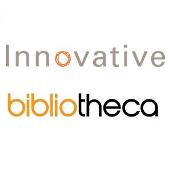Innovative Interfaces, Bibliotheca Announce Strategic Partnership
 Innovative Interfaces Inc. (III), developer of the Millennium ILS and next-generation Sierra Services Platform among other discovery and automation solutions, this month announced a partnership with Bibliotheca, the global RFID, EM/RFID hybrid and barcode-based library solutions supplier. Both companies describe the partnership as a strategic alliance that will enhance the integration of their respective software and hardware products, generating value-added offerings for libraries that use an Innovative ILS and Bibliotheca equipment.
Innovative Interfaces Inc. (III), developer of the Millennium ILS and next-generation Sierra Services Platform among other discovery and automation solutions, this month announced a partnership with Bibliotheca, the global RFID, EM/RFID hybrid and barcode-based library solutions supplier. Both companies describe the partnership as a strategic alliance that will enhance the integration of their respective software and hardware products, generating value-added offerings for libraries that use an Innovative ILS and Bibliotheca equipment.
Under the terms of the agreement, Innovative will have the right to market and resell Bibliotheca products under the III brand in every market they serve, including the Americas, Europe, and Australia. Formalizing a relationship between the companies’ marketing, support, and consulting organizations will help streamline the combined deployment of their respective ILS and hardware solutions, according to a joint announcement.
Gene Shimshock, senior vice president of global marketing for Innovative, noted that partnerships have been an emphasis of Kim Massana, who was appointed CEO of Innovative in August 2012. In 2013, for example, the company has announced expanded strategic partnerships with EBSCO and the EBSCO Discovery Service, social networking solution provider ChiliFresh, and Bowker Syndetic Solutions. Sierra itself was designed with an open source PostgreSQL database, an open source Apache Lucene index, and a suite of open APIs to simplify work with third-party developers.
“Over the past year, we’ve really made an effort to engage all of our partners; this really came out of some of those exploratory discussions,” Shimshock said. “The outreach, on both sides, led to what we believe will be a fruitful partnership.”
Shimshock declined to describe specific features that will result from the partnership, although he noted that end-user experience will be a focus.
“A lot of it has to do with circulation—checking in and checking out materials—so that the patron experience is a lot smoother and a lot quicker,” he said. “We can bring more information to the [self-check] screens. And on the staff side, we see opportunities in management reporting and better control of the extended system through one common interface, which we’ll be working on.”
This III and Bibliotheca alliance is somewhat similar to a partnership announced between Polaris Library Systems and 3M Library Systems two years ago, while those companies were working to integrate the 3M Cloud Library with the Polaris ILS. In July 2012, Polaris began selling 3M’s automated materials handling, RFID, and SelfCheck systems. As that partnership demonstrated, when vendors work closely together, it can help simplify similar work with other vendors down the road. The APIs that Polaris and 3M developed together within months helped facilitate the integration of the 3M Cloud Library into other ILS and discovery solutions, including III Encore.
Like the Polaris and 3M partnership before it, this Bibliotheca, III alliance does not imply exclusivity for either brand.
“The way that we are integrating our systems, from a technology point of view, is using standards that are either out in the market at the moment [such as SIP2], or are in the process of being adopted, and we’re very clear that we want to do it that way,” said Andy Chadbourne, director of marketing and product development for Bibliotheca. “What we’ll be looking to do is align our development teams to make the customer experience the best it can be, but equally, showing the market that we’re doing that by embracing new, open standards. Moving forward, I think we’ll be very vocal on both sides, on how we’re doing things, and on the open standards philosophy that we’re approaching.”
Chadbourne predicts that customers of both companies will begin to see benefits as soon as this summer, although he also declined to discuss specific features.
“I think the customer base can have confidence that they are going to see some things pretty quickly,” he told Library Journal. “We’re already working on them.”
RELATED
ALREADY A SUBSCRIBER? LOG IN
We are currently offering this content for free. Sign up now to activate your personal profile, where you can save articles for future viewing









Add Comment :-
Comment Policy:
Comment should not be empty !!!